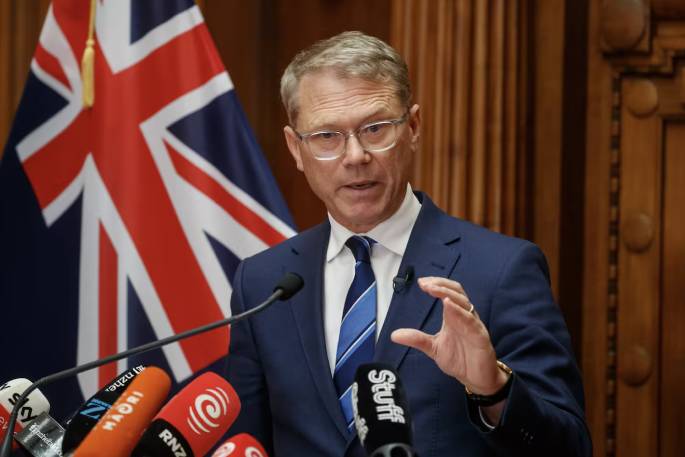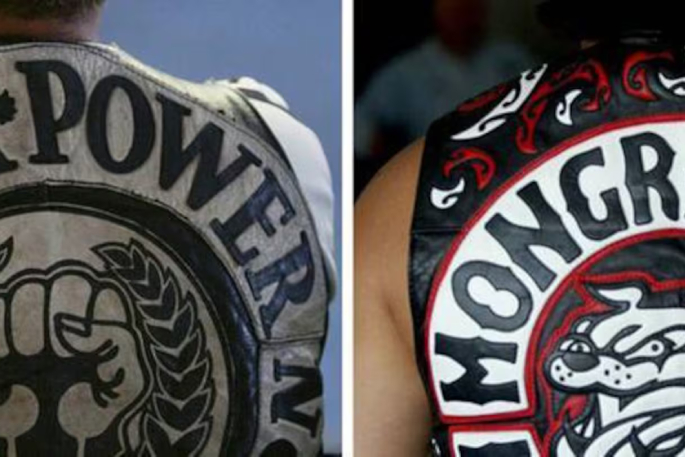- The Gangs Act 2024 came into force at midnight, with police making their first arrest at 12.03am.
- Justice Minister Paul Goldsmith says “the free ride for gangs” is over, promising active enforcement.
- Opposition MPs have raised concerns about safety, potential misuse of police powers, and rights issues.
Police have made their first arrest under new anti-gang laws, with the country’s new top cop confident there’ll be “more to come”.
Police commissioner Richard Chambers told Newstalk ZB’s Mike Hosking the new gang insignia law, which came into effect overnight, has already been used.
”Three minutes past midnight my staff stopped a vehicle displaying gang insignia and they are now facing prosecution,” Chambers said.
He told Hosking the person staff dealt with was respectful and followed the orders of police.
”I’m happy with how that went and I suspect there will be more to come,” he said.
A police spokesperson confirmed a 51-year-old Napier man had been caught displaying gang insignia in public.
“The man was stopped by Police in Southampton Street, Hastings at 12.03am today, after officers observed a large Mongrel Mob sign on the dashboard of his car.
“The man was issued a summons to appear in court at a later date and the sign has been confiscated.”
Lifetime Black Power member and community advocate Denis O’Reilly wasn’t surprised by the immediate action.
Speaking to Newstalk ZB Wellington Mornings host Nick Mills, O’Reilly said his “initial response” to the news was actually given about a week or two ago, “when I said there will be policemen waiting from midnight for the new law to take action”.
He said he was trying to get everyone to “stay calm” as the law rolled out, and “look after each other’s families - I’m talking about police families as well as gang families”.
The Gangs Act 2024 bans the display of gang patches in public places, and provides extra tools to target gang-related crime and intimidation.
Courts will be able to issue non-consorting orders, and police will be able to stop criminal gang members from associating and communicating.
But it has prompted concern from Opposition MPs about the reaction from gang members and questions about how police will enforce the new law while maintaining their own safety.
 Justice Minister Paul Goldsmith says “the free ride for gangs” is over. Photo / Mark Mitchell.
Justice Minister Paul Goldsmith says “the free ride for gangs” is over. Photo / Mark Mitchell.
On Wednesday Justice Minister Paul Goldsmith said “the free ride for gangs” was now over.
“Gang patches will no longer be able to be worn in public. To earn the right to wear a gang patch you have to have committed violent crime. There are a trail of tears and victims behind each one of those gang patches,” he said in a statement.
Yesterday Assistant Commissioner Paul Basham said police would be “actively enforcing any breaches” with a nationally led plan called Operation Nickel.
“If you wear a gang patch in public, or display a sign or symbol associated with a gang, you can expect the attention of police, either at the time of the offence, or at a time that suits us,” he said.
“There will be no excuses. Anyone found in breach of the law can expect the certainty that police will take action.”
New Gang Disruption Units have been set up across the country to help identify, target and catch priority offenders.
This involves investigating reports of breaches and, when necessary, gathering enough information to carry out search warrants and arrests to retrieve patches or other insignia.
“Our message is simple: Parliament has passed a law, it’s our job to enforce the law, and we will be enforcing it,” Basham said.
New Police Commissioner Richard Chambers said his staff were “ready to go”.
“They’ve got some choices to make,” Chambers said of gang members.
But lifetime Black Power member and community advocate Denis O’Reilly told the Herald’s The Front Page podcast he doubts it will alleviate anything.
“It’s not what you wear, it’s how you behave that’s the issue. If we focused on behaviours, that’s where we’ll get societal change,” he said.
“The advice from most leaders is to leave your patch at home until we see how this thing works out.
“It’s semiotics. You start to try and unpick these things at a semiotic level you end up in a struggle and you could end up with the Nike swish.
“In a way, this legislation is just pandering to an anxious, white, middle-class population, who the research demonstrates are the people least likely to be affected by gang activity.”
When it comes to members who perpetrate crime, O’Reilly claimed it is a small percentage.
“I think most are taxpaying New Zealand citizens and struggling to be good parents. In the same way as cricketers and whatever might use cocaine or other people indulging in different sorts of recreational substances, so do gang members.”
The Green Party has opposed the bill, saying the ban on gang patches in public would put police in a dangerous position, and increasing police powers also increased the ways such powers could be misused.
“There is well-documented evidence that racial bias continues to influence a wide range of policing decisions in Aotearoa, including in relation to charging discretion. We are deeply concerned with introducing new powers that risk these biases becoming further entrenched in police attitudes and practices,” the Greens said.
Attorney-General Judith Collins previously said the gang patch ban was inconsistent with the Bill of Rights Act (Bora), specifically the freedom of expression, association and peaceful assembly. The proposal for dispersal notices was also inconsistent with the right to peaceful assembly.
In her Bora vetting of the bill, she suggested softening those powers, including a more targeted ban when public intimidation was more likely, such as at beaches or playgrounds. An officer could direct the removal of a gang patch in other places “if fear and intimidation is likely to occur”.
The committee did not go ahead with Collins’ suggestions, meaning the Bora issues remain.



1 comment
This is foolish law making
Posted on 22-11-2024 12:57 | By morepork
Instead of addressing WHY people join gangs, it tries to harass them. Illegal activities of gangs must be prosecuted to the full extent of the law, but we don't, and shouldn't have, a law that decides what clothing people can wear (as long as it complies with laws against indecent exposure.) I'd rather see positive work with gangs and a cut in the illegal activity, than something that just makes some anti-gang people "feel good". Gang members are people. They may feel excommunicated from our societies and we should be looking at that. Good actions by gangs can/should be encouraged; bad actions by gangs should be punished effectively to deter them. Harassment or "war" with gangs is a foolish course of action (for both sides). This comes in that category, IMO.
Leave a Comment
You must be logged in to make a comment.